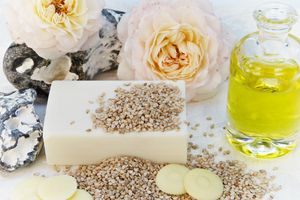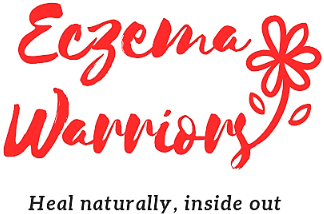When I was much younger, before having any children, I didn’t really care what I put on my skin as a body wash. The main considering factors would probably be
- a brand that I’m comfortable with
- reasonable price
- I must like the smell of the fragrance
- no animal testing
How things have changed now, with two of my children having eczema, I embarked on a quest to find THE natural body wash for eczema kids.

Why it Matters
Some people may ask, why does it even matter what you put on your skin, when your whole philosophy is to heal eczema from inside out?
Yes, our whole philosophy is to heal from inside out, as we now believe eczema is a presentation of some health issue from within, be it allergy, gut-related problem, autoimmune disorder, etc.
BUT, do not forget this fact: the skin is our largest organ, and whatever we put on our skin does get absorbed through the pores, and (some substances) go straight into the bloodstream. So it is certainly worthwhile to pay attention to what we put on the skin, do not be like the ignorant me from years ago.
Moreover, some substances tend to bio accumulate over time, collecting in our tissue, causing us to develop chronic illnesses. In fact, people with eczema are supposedly more sensitive to these foreign substances, and whatever their bodies do not like, they tend to protest through the skin. Hence, skincare products may even be the culprits for a person’s eczema flares.
Toxic Ingredients to Watch Out for
Commercial personal care products contain a whole bunch of toxic ingredients, serving their own functions from preserving shelf life to acting as a surfactant to remove dirt and grease. However, their harmful effects on our health far outweigh their intended purposes. Here I list the top 5 most harmful ingredients commonly found in personal care products.
- Triclosan – this is a pesticide with antibacterial, antifungal and antimicrobial properties. It disrupts thyroid function and reproductive hormones, even in low doses. Due to its potential link to cancer and thyroid issues, the FDA has banned its use in over-the-counter health care antiseptic products since Dec 2017, and in hand soaps and body wash since earlier in 2016. Manufacturers were given one year to reformulate or remove their products. However, it can still be found in hundreds of other products. Moreover, this ruling only covers the U.S. so there could still be many unregulated products all over the world.
- Parabens – these are preservatives intended to prolong the shelf life of personal care products, so that they do not get broken down by bacteria and viruses. The problem with parabens is their link to cancer and the endocrine system. They have also been found to affect reproductive hormones, as well as cause developmental disorders. The good news is, manufacturers are now moving towards paraben-free products! In fact, there are many natural substances that serve the same function, one example is grape seed extract.
- Sulfates (such as SLS, sodium laurel sulfate) – this is what causes the soap or shampoo to foam when you lather up. It is also able to remove dirt and grime from our skin and hair very effectively. Unfortunately, through its cleansing actions, it also strips the skin of its protective barrier and natural oils, causing an imbalance of pH levels on the skin. To top it off, it has been found to be a major allergen, even for people with non-sensitive skin, when used daily in small doses.
- Fragrances – they make you smell nice, but they are usually made up of harmful chemicals that are linked to cancer, the nervous system, as well as allergies. Manufacturers are not required to list the chemicals used in their fragrance mixture, so we never know exactly what is inside the product that contains ‘fragrance’. A research by the Environmental Working Group (EWG) found an average of 14 chemicals in products that contain fragrances, none of which are listed on the labels.
- Formaldehyde – this is a preservative that has been linked to cancer, nervous system issues, and respiratory issues. Once used widely in many personal care products as an antiseptic, its use has declined over the years, but the damage is done, and still doing. It sits on the throne on EWG’s hazard rating, with a score of 10. There are still products containing this substance in the market, so keep your eyes peeled for it.
Ditch the Chemicals, Go Natural
We really do not need the chemicals to keep ourselves clean. In order to get the last speck of dirt off our skin, we intoxicate our bloodstream with carcinogens. It really doesn’t make any sense.
The other extreme would be to use nothing at all, just water. Step into the shower, rinse yourself from head to toe, and towel dry. Why not?

I have done it with my daughter M, during some of her bad eczema flares, when just being in contact with water would make her scream murder, as her skin was so thin and fragile. Under those circumstances, it would be good to just not bath or shower for a few days, give the skin some time to heal and strengthen up, and spare her the pain and emotional trauma. In that case, I just dab a damp face towel all over her body.
Sometimes the weather is really hot and humid and she sweats a lot, I will just bring her under the shower for a few seconds, less than a minute, and out we go to get dry. Even in those few seconds, she would scream in pain, but at least that cleans off the sweat and dirt.
On other days of eczema or topical steroid withdrawal (tsw) flares, we tap into the healing properties of ginger baths, or apple cider vinegar baths, both of which had helped immensely in the healing of my kids’ eczema.
Most of us would not be able to accept just rinsing with tap water, or just using single ingredients like ginger or apple cider vinegar in the bath, as it has become a habit, or rather a lifestyle that manufacturers of personal care products have ingrained in us, with the idea that if we do not use commercial products, we just don’t get cleaned.
So the next best option would be to only use all-natural products, with no chemicals or other harmful substances.
How to Find All-Natural Products
Do not simply believe claims like ‘natural’, ‘hypoallergenic’, or ‘chemical free’ because none of these claims are regulated. In other words, product manufacturers can put anything on their labels, and still have the same harmful substances present in the shampoo or body wash! They have to put these labels simply because consumers respond to them. It ultimately boils down to their sales.
So, you still have to do your homework, and scrutinize the ingredients list. At the most enthusiastic stage of my search for natural products for my kids, I went around armed with a list of the most harmful substances, to make sure the products I buy do not contain any of them. After some time, you will have a sensing of which brands live up to their claims of being ‘natural’, ‘gentle on your skin’, etc.
After learning about harmful substances in personal care products, the moment I pick up a body wash, for instance, and see the ingredient SLS, I will put it back on the shelf right away. You will be surprised how many common brands do not pass the simple test of the top harmful ingredients listed above.
Generally, companies have to list their ingredients in order of decreasing concentration. So the first few ingredients would make up the bulk of the product. If they look suspicious or sound synthetic, do a quick search to check them out.
What it means is that if the first few ingredients are all chemicals, followed by some natural extracts at the bottom of the list, you know this company is trying to bluff its consumers.
Conclusion
So these are the general guidelines we have been using when it comes to uncovering the natural products that would work well for our eczema kids. If you would like to find out which are the trusted products that we use, these articles review the best natural body wash for eczema skin, and the best natural soap (for body and many other uses).
Which are your most trusted brands? Do feel free to share them and your experience in the comments below.

I am never not amazed when I read information about chemicals and toxic substances in every day products. It just seems insane to me that they’re even in those products, especially when there are so many simple and helpful natural alternatives. Thank you for sharing what you’ve learned in how to treat ezcema!
Hi Penelope,
Thank you for dropping by! Yeah it’s amazing isn’t it, that even products touted as ‘gentle’, ‘for babies’, etc. are loaded with harsh chemicals.
This is very informative and helpful! I struggle with mild eczema from time to time especially with the cold and dry weather here in Canada. It is a great reminder that many shampoos and other hygienic products may still contain bad chemicals… This is very good to know, thank you!
Hi Sarah,
Thank you for dropping by. Yeah so many commercial personal care products contain chemicals which are usually harmful. Stay safe and natural.